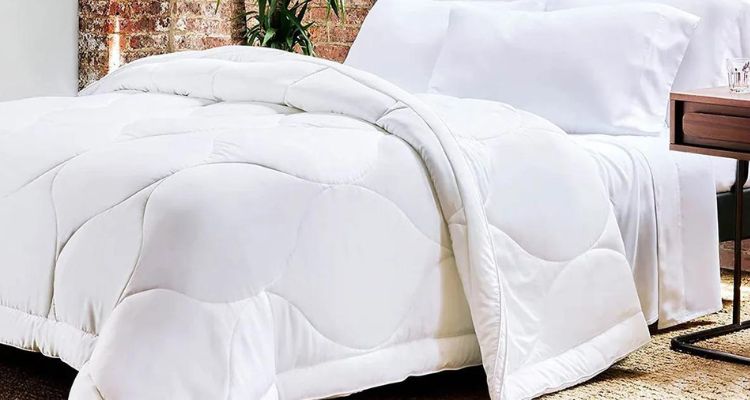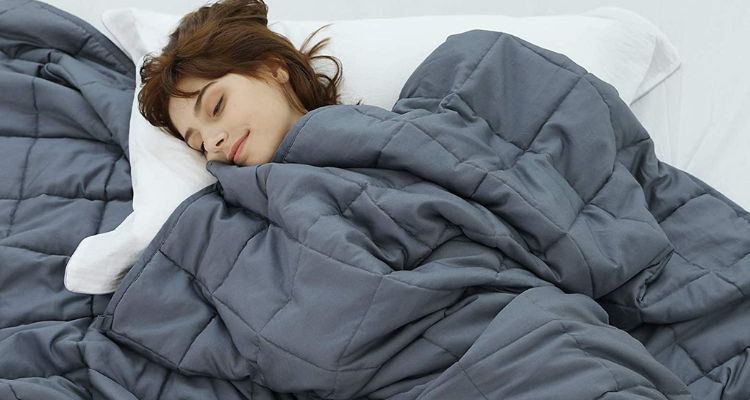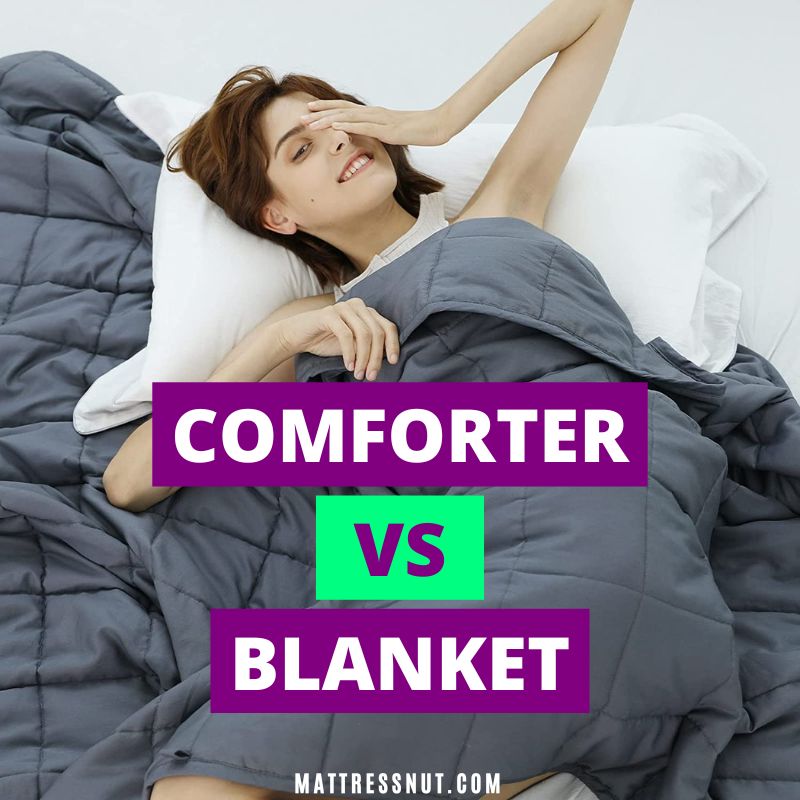It might seem that comforts and blankets are the same, but they are not (also check duvet vs comforter). These two products are made of different materials. Moreover, a blanket comprises a single layer, while a comforter is made of a dual-layer thin fabric.
One of these layers is an insulating material. That is why these comforters can provide more warmth than single blankets. But there are various other factors you must consider here when choosing between a comforter over a blanket or vice versa.
In this guide, we will look at all those factors one by one and see which of these two options comes out on top.
What’s a Comforter?
A comforter is the main type of bedding accessory that keeps your body comfortable and warm. It is soft and filled with polyester, wool, silk, or cotton. Additionally, most comforters are closed by using buttons or zips.

The basic point of a comforter is that it is made with multiple layers and has excellent insulation properties. It consists of three layers: back, front and insulation layer.
This is the most comfortable and suitable accessory during colder seasons. Some comforters have a detachable lower layer to make it less warm. Those types of comforters are useful during summers.
Who Should Use a Comforter?
A comforter comes with three layers that make it ideal for winter. There is no need to cover your comforter. They already come with a good cover. It gives you a luxurious feel and keeps you comfortable and warm (also check the top rated bed sheets with great comfort).
A comforter is a good option if you are not a hot sleeper (also check the top-quality cooling mattresses for hot sleeper). A thicker layer comforter keeps your body heat inside to keep you warm during colder months, these are not highly breathable.
Pros of a Comforter
- A comforter is made with a 3-layer that makes it fluffy and warmer.
- It has a great insulating capacity, giving you ideal warmth during the colder season.
- These are more comfortable and fluffy bedding accessories.
- You can use it as a mattress topper or a bedsheet to enhance your bed’s beauty.
- It comes in larger sizes and is a long-lasting investment.
- These are highly durable with all types of materials.
Cons of a Comforter
- Storing and washing is a very difficult task.
- They come in large sizes only, so they cannot be used on your sofa.
- It is not suitable for all-weather, only comfortable during colder months.
- High maintenance is required for cleaning.
What’s a Blanket?
A blanket is generally anything that comes with a thicker than bed sheets or bed linens. It comes with a rectangular shape like a single sheet. The most popular blankets use multiple materials such as fleece, wool, and cotton (check the top rated fleece blankets).
Wool and fleece blankets are the best replacement for lightweight comforters because they don’t have the same capacity insulation. Additionally, some microfiber blankets are made with cashmere or silk. However, they are expensive options as compared to regular blankets.
Who Should Use a Blanket?
In the winter season, it is a mandatory bedding accessory that everybody wants. A blanket traps heat from the sleeper’s body, especially at night, and keeps your body warm. Some blankets give a luxurious and comfortable feel, and some keep you warm.
The physical sensation of a blanket enhances comfort and feel. A blanket is a single layer, so in colder months, you need an additional layer to warm yourself.
It is also very convenient to store in your cabinet because you can easily fold it and put it into a storage bag for further use. The cleaning and maintenance are agile and easy. You have to follow washing instructions to remove dirt.
Pros of a Blanket
- Blankets are lightweight options because they are made with a single layer of filling.
- A blanket that is filled with high-quality wool featuring a high insulation trait.
- A perfect selection for warmer seasons because keeping your body heat inside a blanket keeps you warm.
- It is easy to store because you can easily fold it; some are easily washable.
- Fleece or cotton-made blankets are more comfortable because they give a fluffy feeling.
Cons of a Blanket
- Only wool or fleece materials give a fluffy feel.
- Insulation property always depends on the materials that decrease comfort.
- A blanket comes with less durability and lacks warmth.
- Woolen blankets are a little bit costly.

What’s the Difference Between a Comforter and a Blanket?
| Comforter | Blanket | |
| Filing and fabric | Natural down (duck or goose feathers) or alternate filling including silk, wool, polyester, and cotton. | It’s just a single layer of fabric with less insulation and is suitable for hot sleepers. |
| Weave | Loose and quilted weaves are available. | Tight weaving but knitted options are available. |
| Season | Good for colder seasons and regular use. | Good for colder seasons only. |
| Warmth level | Excellent for insulation and extra warmth. | Blankets are less warm as they are a single layer of fabric. |
| Storage | Treating a comforter can be challenging because they have plenty of lofts and can take ample space. | They are much easier to store because they don’t have much loft and don’t take up much space. |
| Care and maintenance | Down-filled comforters must be dry-cleaned or washed with gentle cycles to protect the soft fill. | Blankets are more robust and may need specific washing based on their label. |
| Dust mite resistance | The filling here can trap dust and be a breeding ground for dust mites. | Blankets can offer good dust mite resistance as dust mites can’t sneak inside. |
| Price | Varies in price but can be expensive due to their filling. | More affordable. |
Filling & Fabric – Ultimate Winner is Comforter
Comforters are generally filled with multiple natural down materials, including goose or duck feathers or organic cotton, silk, wool, or polyester. But goose or duck feathers are incredibly warm and comfortable. And other materials offer much warmth and make it loft for some people.
On the other hand, blankets come with a single fabric layer. This is ideal for hot sleepers who want less insulation. However, blanket layering provides excellent warmness during colder nights. These blankets are often filled with cotton, wool, and polyester. A fluffy blanket is wool insulated with wool for better protection against cold.
Weave – Award Goes to Blanket
This is the main consideration for airflow. Multiple materials are used to fill both blankets and comforters. As a result, the airflow in the comforters is less as compared to blankets. So, the comforters are for colder months. Meanwhile, blankets are a good option for summers. Comforters come only in large sizes that make them heavy.
Season – Winner is Blanket
Both comforters and blankets are the most popular bedding accessory that changes according to temperature change.
A blanket is a good option for both summer and winter (also check the best selling bed sheets for summer). This is because of single-layer fabric construction. It keeps you warm because of its insulation property. Both are used wool, cotton, silk, polyester, and other natural materials to provide comfort and warmth.
Apart from that, comfort comes with thicker layers that keep you warm, especially for colder months. The more layers offer more warmth. However, you can cover it for further layering of warmth. But this is not a suitable option for a hot sleeper.
Warmth Level – Our Vote is for Blanket
Blankets are an excellent option if you render less warmth because it is made with a single-layered fabric. A single-layer blanket is insulated with less material, making it a lightweight choice. But it provides less warmth so that you can use it during winter or summer (also check the top rated bed sheets for winter).
This is because a blanket anticipates the temperature-changing trait. On the other hand, natural duck and goose feathers are well-known insulation materials that a comforter has. This material makes a comforter more comfortable and warmer.
Storage – Ultimate Winner is Blanket
With the change of temperature, you need to change your bedding accessories, especially for summer and winter.
Storing a blanket is much easier as compared to comfort. This is because a blanket comes with a single fabric layer. And, it is easy to fold and put in the storage bag for future use. It can easily fit in small spaces.
Furthermore, a comforter comes with 3 layers, making them fluffy and big. So, it isn’t easy to fold and store.
Care & Maintenance – Award Goes to Comforter
Both comforters and blankets need cleaning and maintenance because it increases their lifespan. But, before washing them, you must read washing labels or instructions carefully. Some down-filled comforters need only dry cleaning or other gentle cycles to wash them.
On the other hand, blankets are made with more robust fabric, but you also need to read labels for caring instructions. However, you can use a cover for a comforter to protect you from dust or dirt.
Dust Mite Resistance – Ultimate Winner, is Blanket
Comforters have their filling, which makes them different from blankets, which makes them more functional than blankets.
But their filling makes them less resistant to dust mites because this filling can also be the house for dirt and dust mites. But this is not the case if you look at the construction of these blankets.
They don’t have any filling, and it’s just a single layer of fabric that doesn’t have any room or sauce for any dirt or mites.
Price – Our vote is for Blanket
When it comes to price, ballets have a clear advantage over comforters. Blankets are just a single layer of fabric, so their design has no complication.
Comforters are not that complicated in their construction. But they do have a filling, and this feeling will be a massive contributing factor in deciding the price of that comforter.
Down filling will be considered expensive compared to other types of filling. But even if you go for a synthetic down alternative, a comfort will still end up being pricier compared to a blanket.
Conclusion
Comforters and blankets are both comforting. You can choose between them based on your climate and how hot you tend to sleep.
If you sleep hot or experience hot flashes during your sleep, a blanket would be a good option for you. Otherwise, comforters are better in a colder climate or if you tend to sleep cold.
Single-layer blankets are good to use almost in all seasons, excluding the colder ones. But comforters come in handy during the colder months.

